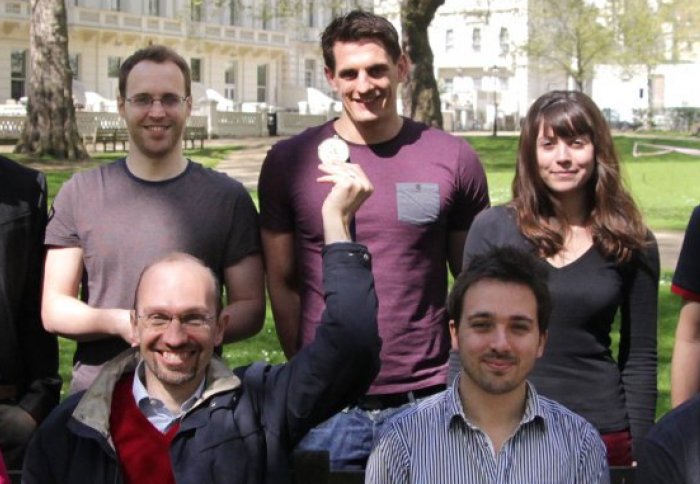
Adam with colleagues in the signal processing group

Dr Adam Scholefield, a postdoctoral researcher and Olympic water polo player talks about life post-London 2012 and future plans.
It’s safe to say Adam Scholefield is not your average postdoc scientist. Although the Olympic water polo player says he officially retired from the sport after London 2012, he still cuts an imposing figure, especially with his new Olympic rings tattoo etched into his substantial upper arm.
As it happens, Adam was persuaded to make a return to the pool recently for the Commonwealth Water Polo Championships in Glasgow in April (the sport doesn’t feature in the main Commonwealth Games programme this summer), helping England to their first ever gold in the event.
 “I really didn’t think I would be able to fit the training in with my research work, but in the end it came together and it was a great result, especially after we came fourth place last time round in Australia."
“I really didn’t think I would be able to fit the training in with my research work, but in the end it came together and it was a great result, especially after we came fourth place last time round in Australia."
He adds that having the Ethos pool and gym so close by helped him to squeeze in a few hours around work in order to get match fit.
“Luckily for me, experience is also a key element in water polo – much like in football where you have Ryan Giggs playing at 40 – there are other things you can bring to the game as a senior player.”
Adam, 28, who originally hails from Morley, West Yorkshire, played water polo professionally for six years including two in the ultra-competitive Hungarian pro leagues – culminating in his tenure as vice-captain for the GB men’s water-polo team at the London 2012 Olympic Games. Oh, and he also found time to get a MEng and PhD in the Department of Electrical and Electronic Engineering at Imperial, handing his thesis in last year.
“When you’re playing professionally it’s intense. I used to train for 5 hours a day. And it matters so much; every Saturday that game is your focus and if you lose it ruins your whole week and you go into a sort of depression. Of course I was very lucky to get the opportunity to do that, but priorities change over time.”
Adam is now fully focussed on his research in image processing and credits Dr Pier Luigi Dragotti, his supervisor during his PhD and now postdoc work, for keeping him on track.

Dr Pier Luigi Dragotti
“He went out of his way to construct a PhD project and working arrangements that allowed me to do both my studies and sport. Failed PhD students look very bad on supervisors so I guess he trusted me enough to take the gamble!”
One avenue that has proven particularly fruitful for Adam is the technique of super resolution. In smartphones the quality of the captured image is limited by the compact dimensions – but by taking multiple images and combining them using clever post-processing you can achieve a better image.
“Digital imaging is really in its infancy. Before all the talk was of the number of mega pixels, but often information is blurred over the pixels and you’re not getting the resolution quoted. We’re starting to be able to use the pixel arrays more smartly.”
He is also interested in exploring the burgeoning areas of depth perception imaging – technology used in the Microsoft Kinect gaming device favoured by researchers and hackers – as well as light field imaging, where a camera is able to record information about the position of light rays allowing huge control of creative visual effects in post-production editing.

The Communications and Signal Processing Group with Pier Luigi holding Adam's Commonwealth Gold Medal
Adam is set to leave Imperial in June to take up a postdoctoral position with EPFL in Switzerland in conjunction with start-up company Vidinoti, investigating ways to use light field cameras to enhance their proprietary augmented reality technology and products.
It marks the end of an era in London that holds many great memories of studying and sports – with two unforgettable weeks ‘craziness’ as he puts it, in the Summer of 2012.
 Following the Olympics, central funding for water polo was slashed, leaving little hope for GB qualification for the Rio Games in 2016. Adam is now involved in the management of the sport in a voluntary capacity, helping to make tough decisions about how to allocate the scarce resources they do have and how they might seek to attract more funding.
Following the Olympics, central funding for water polo was slashed, leaving little hope for GB qualification for the Rio Games in 2016. Adam is now involved in the management of the sport in a voluntary capacity, helping to make tough decisions about how to allocate the scarce resources they do have and how they might seek to attract more funding.
Though he’s not ruling out a return to the Olympic arena someday – perhaps in some sort of official or coaching position.
“Watching the Winter Olympics in Sochi earlier this year kind of brought it all back how amazing it was; in some ways you don’t appreciate it fully at the time when it’s happening.”
Adam was a recipient of a Student Opportunities Award. Find out how you can help to support students like Adam
Article text (excluding photos or graphics) © Imperial College London.
Photos and graphics subject to third party copyright used with permission or © Imperial College London.
Reporter
Andrew Czyzewski
Communications Division

Contact details
Email: press.office@imperial.ac.uk
Show all stories by this author



Leave a comment
Your comment may be published, displaying your name as you provide it, unless you request otherwise. Your contact details will never be published.